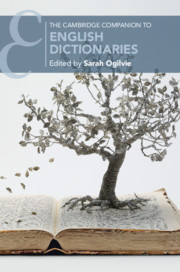Book contents
- The Cambridge Companion to English Dictionaries
- The Cambridge Companion to English Dictionaries
- Copyright page
- Dedication
- Contents
- Illustrations
- Tables
- Notes on Contributors
- Acknowledgements
- Chronology
- Chapter 1 Introduction
- Part I Issues in English Lexicography
- Part II English Dictionaries Throughout the Centuries
- Chapter 8 A Dictionary Ecosystem: Four Centuries of English Lexicography
- Seventeenth-Century English Dictionaries: Hard Words
- Chapter 9 Cawdrey, Coote, and ‘Hard Vsual English Wordes’
- Chapter 10 Seventeenth- and Eighteenth-Century English Lexicography
- Eighteenth-Century English Dictionaries: Prescriptivism and Completeness
- Nineteenth-Century English Dictionaries: Descriptivism
- Twentieth and Twenty-First-Century Dictionaries
- Part III Dictionaries of English and Related Varieties
- Guide to Further Reading
- Index
- Cambridge Companions to Literature
Chapter 10 - Seventeenth- and Eighteenth-Century English Lexicography
from Seventeenth-Century English Dictionaries: Hard Words
Published online by Cambridge University Press: 18 September 2020
- The Cambridge Companion to English Dictionaries
- The Cambridge Companion to English Dictionaries
- Copyright page
- Dedication
- Contents
- Illustrations
- Tables
- Notes on Contributors
- Acknowledgements
- Chronology
- Chapter 1 Introduction
- Part I Issues in English Lexicography
- Part II English Dictionaries Throughout the Centuries
- Chapter 8 A Dictionary Ecosystem: Four Centuries of English Lexicography
- Seventeenth-Century English Dictionaries: Hard Words
- Chapter 9 Cawdrey, Coote, and ‘Hard Vsual English Wordes’
- Chapter 10 Seventeenth- and Eighteenth-Century English Lexicography
- Eighteenth-Century English Dictionaries: Prescriptivism and Completeness
- Nineteenth-Century English Dictionaries: Descriptivism
- Twentieth and Twenty-First-Century Dictionaries
- Part III Dictionaries of English and Related Varieties
- Guide to Further Reading
- Index
- Cambridge Companions to Literature
Summary
This chapter explains the evolution of ‘hard-word’ dictionaries in English lexicography during the seventeenth century. Through a discussion of how lexicography and natural philosophy were emerging and how scientific methods were being applied to language, it traces the development of dictionaries and what kinds of information went into them. We see that the first monolingual dictionaries were lists of words; subsequently, those lists included short definitions of terms borrowed from other languages. Soon, dictionaries provided definitions of technical terms and jargon – the ‘hard words’ – and finally, dictionaries developed into encyclopedic reference works that added information on the history and development of the language and practical uses of a dictionary for words in general use. Last, the chapter details a famous case of lexicographical plagiarism to present how the concept of authorship has changed over time.
- Type
- Chapter
- Information
- The Cambridge Companion to English Dictionaries , pp. 114 - 126Publisher: Cambridge University PressPrint publication year: 2020



